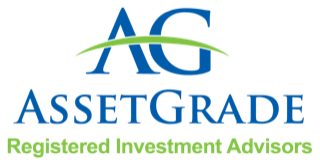BY: KATE HENNESSY
Last month I mentioned that my husband and I were considering converting a portion of my Traditional IRA to a Roth IRA, otherwise known as a Roth IRA conversion. After doing the analysis and speaking with our CPA, we decided to convert 1/3 of my Traditional IRA to a Roth IRA. While It wasn’t the full amount in my account, it started the ball rolling and we committed to revisiting the remaining 2/3 in the future.
Calculating the impact to our taxable income was relatively easy. At AssetGrade we use a robust planning tool and by using the tool I was able to use a Roth Conversion calculator and determine what the impact to our taxable income would be this year. Without the Roth conversion we were at a certain tax rate, and after the conversion we moved to the next highest tax rate. Because the State of Illinois does not tax retirement income, I used our federal tax rate to calculate the impact to our taxable income. The tool also allowed me to project the value of both my Traditional and Roth IRA accounts in retirement using an assumed tax rate and growth rate. As a result, I could select various tax rate scenarios to determine how much I would lose vs gain by doing the conversion today.
So, why convert if you don’t know the direction of tax rates? We made a call - we believe tax rates may be higher and/or that our state (Illinois) may tax retirement income in the future. Illinois is one of a few states in the U.S. that does not tax retirement income. However, this year the state is introducing a “fair tax” measure on the November ballot which is a progressive income tax proposal. Supporters of the progressive income tax believe that retirement income in Illinois may be taxed down the road. Aside from making a bet on tax rates, we also wanted to leave ourselves options in retirement. We didn’t want all of our assets tied up in tax deferred and taxable accounts. Instead we’ll grow a portion of our retirement funds in after tax money (Roth IRA) which will not require us to take a RMD (required minimum distribution) in retirement. This is a benefit because we won’t be forced to take distributions in retirement in down markets.
A Roth Conversion isn’t right for everyone and who knows where tax rates will be 5, 10, or 20 years. But, if you find yourself in a year….
- where your income is lower than recent years
- you have the cash to pay additional taxes this year
- you believe that tax rates may go up in the future
- you live in a state that does not tax retirement income, but may in the future
….a Roth Conversion may be right for you.
Please call or email us if you are interested in learning more if a Roth Conversion is right for you.


